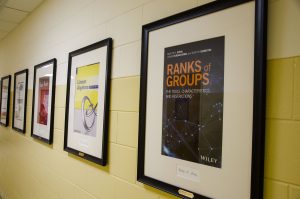 The faculty in the Department of Mathematics conduct research in a broad variety of areas. Learn more about research groups in the department and which areas the faculty members work in below.
The faculty in the Department of Mathematics conduct research in a broad variety of areas. Learn more about research groups in the department and which areas the faculty members work in below.
Read about research news and faculty accomplishments.
Faculty Research Areas
Algebra
- Ulysses Alvarez: algebra, combinatorics, topology
- Jon Corson: geometric group theory
- Kyungyung Lee: algebra, combinatorics, geometry, topology, mathematical physics
- Thomas Polstra: commutative algebra, algebraic geometry
Learn more about this specialty on the algebra research group page.
Analysis
- Simon Bortz: harmonic analysis, geometric measure theory, partial differential equations
- David Cruz-Uribe: harmonic analysis, partial differential equations
- Tim Ferguson: complex analysis, operator theory, harmonic analysis
- Kabe Moen: harmonic analysis, partial differential equations
- Abba Ramadan: calculus of variations, analysis of nonlinear partial differential equations and their applications in physics, materials science, and fluid mechanics.
- Yuanzhen Shao: partial differential equations, geometric analysis
- Robert Smits: real and stochastic analysis, learning from data, applied probability, eigenvalue problems for partial differential equations
Learn more about this specialty on the analysis research group page.
Data Science and Optimization
- Yuhui Chen: big data analysis, Bayesian nonparametric modeling, survival models, statistical computing,
- Min Sun: global optimization and game theory with applications, modeling, simulation
- Chuntian Wang: supervision-aware dimensionality-reduction models for classification, dynamic topic modeling with tensor decomposition, concept discovery approaches in medical image
- Yiran Wang: scientific computing, numerical analysis, machine learning
- Wei Zhu: data analysis, image processing, numerical methods for partial differential equations
Learn more about this specialty on the data science and optimization research group page.
Geometry and Topology
- Ulysses Alvarez: algebra, combinatorics, topology
- Jon Corson: low dimensional topology
- Kyungyung Lee: algebraic geometry, cluster algebras, mathematical physics, Jones polynomials.
- Lawrence Roberts: low dimensional topology, homology theory, knot theory
- Bulent Tosun: low dimensional topology, contact and symplectic geometry
Learn more about this specialty on the geometry and topology research group page.
Math Biology
- David Halpern: biofluid mechanics, pulmonary airway mechanics
- Hai-Dang Nguyen: stochastic processes, optimal control in population dynamics and infectious diseases
- Yuanzhen Shao: mathematical modeling of biomolecular problems
- Chuntina Wang: crime modeling, human-behavioral modeling, epidemic modeling with social behavior, Poisson processes, Markov pure jump processes, chemo-taxis equations
- Shan Zhao: mathematical methods for molecular bioscience and biophysics
Learn more about this specialty on the math biology research group page.
Math Education
- Jim Gleason: mathematical knowledge for teaching, educational measurement
- Martha Makowski: math education, developmental math, STEM access, quantitative and mixed methods
Learn more about this specialty on the math education research group page.
Numerical Analysis and Scientific Computing
- Roger Sidje: numerical methods for ordinary differential equations, numerical linear algebra, computational biology
- Zheng Sun: numerical methods for partial differential equations, computational physics, discontinuous Galerkin methods
- Shan Zhao: numerical methods for partial differential equations, interface problems
- Wei Zhu: image processing, numerical methods for partial differential equations
Learn more about this specialty on the numerical analysis and scientific computing research group page.
Partial Differential Equation Modeling and Analysis
- Shibin Dai: calculus of variations, free boundary problems, and their applications in physical, biological, and materials science
- Tiziana Giorgi: nonlinear partial differential equations, soft matter systems, superconductivity
- David Halpern: interfacial fluid mechanics, surfactant spreading on viscous fluids, scientific computing
- Abba Ramadan: calculus of variations, analysis of nonlinear partial differential equations and their applications in physics, materials science, and fluid mechanics.
- Mojdeh Rasoulzadeh: homogenization method, flow, and transport in heterogeneous porous media
- Yuanzhen Shao: geometric flows, nonlocal diffusion, fluid dynamics, mathematical biology
- Chuntian Wang: advection-reaction-diffusion equations, mean-field population models, and partial differential equation modeling with applications in human behavior and epidemics dynamics
- Wei Zhu: image processing, numerical methods for partial differential equations
Learn more about this specialty on the partial differential equation modeling and analysis research group page.
Probability & Statistics
- Yuhui Chen: big data analysis, Bayesian nonparametric modeling, survival models, statistical computing
- Hai-Dang Nguyen: stochastic processes, optimal control, dynamical systems, stochastic approximation
- Robert Smits: stochastic processes, stochastic differential equations, game theory
- Chuntian Wang: stochastic partial differential equations, statistical-stochastic modeling with applications
Learn more about this specialty on the probability & statistics research group page.